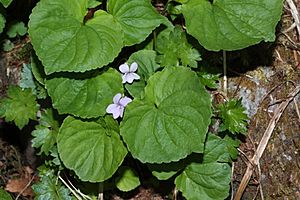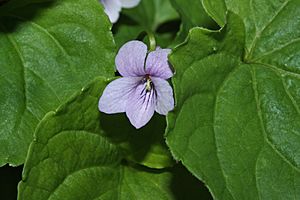Marsh violet facts for kids
Quick facts for kids Marsh violet |
|
|---|---|
 |
|
| Scientific classification | |
| Genus: |
Viola (plant)
|
| Species: |
palustris
|
The Marsh Violet (Viola palustris) is a pretty wild flower. It is also called the Alpine Marsh Violet. This plant grows year after year, so it's a perennial plant. It's a type of forb, which means it's a flowering plant that isn't a tree or a shrub. You can find it in wet places like damp meadows, marshes, and along stream banks. It grows in northern parts of North America and Eurasia. The name palustris comes from Latin and means "of the marsh." This tells us where it likes to live!
Contents
About the Marsh Violet
The Marsh Violet is a small plant, usually 5 to 22 centimeters (about 2 to 9 inches) tall. It feels smooth, without any hairs. It grows from thin underground stems called rhizomes. These rhizomes help the plant spread.
Leaves and Stems
The leaves of the Marsh Violet are shaped like a heart or a kidney. They are about 2.5 to 3.5 centimeters (1 to 1.4 inches) wide. The edges of the leaves have wide, flat teeth. The leaf stems, called petioles, can be 2 to 17 centimeters long.
Flowers
The flowers are white to light purple. They are small, about 10 to 13 millimeters (0.4 to 0.5 inches) long. Each flower grows on its own stem, called a peduncle. These flower stems are usually about the same length as the leaf stems. The three bottom petals of the flower have thin purple lines. The two petals on the sides have a few tiny hairs, which makes them look "bearded."
What Eats the Marsh Violet?
The Marsh Violet is an important food source for some butterflies. Two types of butterflies, the pearl-bordered fritillary and the small pearl-bordered fritillary, use this plant. Their caterpillars eat the leaves of the Marsh Violet as they grow.
Images for kids
See also
 In Spanish: Viola palustris para niños
In Spanish: Viola palustris para niños



